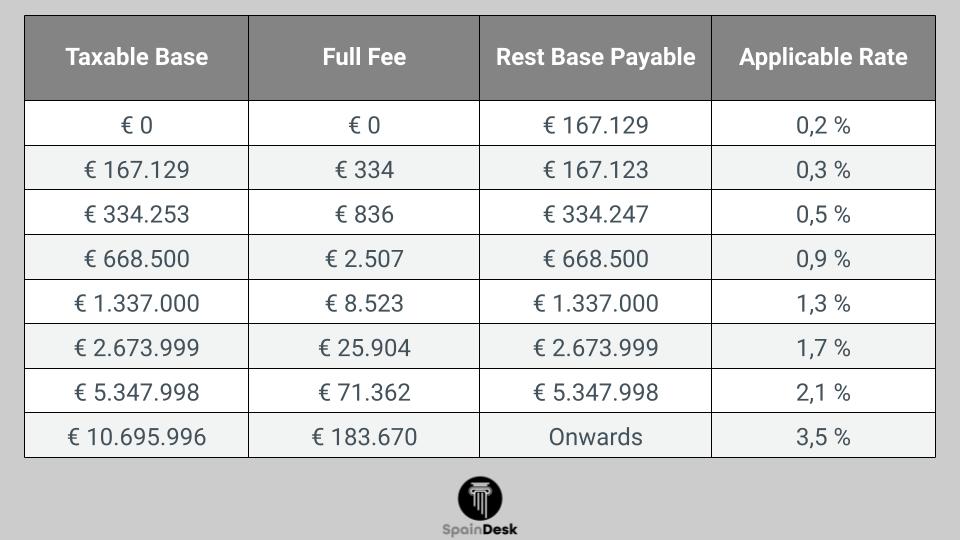Wealth Tax in Spain in 2021: What Do You Need to Know
The Spanish wealth tax, otherwise known as ‘Impuesto sobre el Patrimonio,’ is an annual tax placed on wealthier individuals and families in Spain. While this form of taxation doesn’t necessarily apply to most people, it can significantly impact those with substantial wealth and even deter many from ever moving to this beautiful country. However, strategic and careful planning coupled with professional guidance will assist you in minimizing your wealth tax liability and, ultimately, fulfil your ambitions of living in Spain.
Content
Residency considerations related to wealth tax
An essential distinction in Spain related to the wealth tax is between residents and non-residents. At the same time, both residents and non-residents need to pay wealth tax. In general, non-residents will have to pay less than residents.
You are a resident in Spain for tax purposes if you spend more than 183 days per year in Spain (6 months). On the other side, only spending 182 days or fewer in the country will classify you as a non-resident for tax purposes in Spain. In this way, having a residency permit does not automatically make you a tax resident in Spain.
Get taxes done more quickly and efficiently with our tax services in Spain
Non-residents in Spain and wealth tax
If you’re living in Spain as a non-resident for tax purposes, you’ll only be taxed on your assets within the country that is valued at over €700,000. This means that if all the rest of your possessions are located outside of Spain, they are not subject to wealth tax. Situations, where you will be a non-resident and have to pay wealth tax, are:
- When you are a married couple, you can claim an allowance of €1,400,000 against all included joint assets.
- If you inherit wealth above €700,000 from Spain, you will have to pay inheritance tax, and you will have to start paying wealth tax.
- In general, when you have a double nationality, you will not have to pay wealth tax over all your assets when you are located abroad for more than 183 days of the year.
Exemptions for non-resident wealth tax in Spain
For non-residents, there is only an individual deduction of €700,000 on the Spanish wealth tax.
Residents in Spain and Wealth tax
If you are living in Spain as a resident for tax purposes, you will be taxed on your worldwide assets that are valued at over €700.000. This means that on top of your assets located in Spain, the value of all your assets will be included for wealth taxation purposes in Spain, which can lead to a significant overall tax increase. Situations where you will have to start paying wealth tax as a tax resident are:
- Working in Spain full time
- Retiring in Spain
- Staying 183 or longer in Spain
Exemptions for tax residents in Spain
There is a range of exemptions, and you can also claim a personal tax-free allowance that varies based on the region you live. Some exemptions include:
- Individual deductions on the national level are €700,000. However, autonomous regions can have a different rate. For example, the deduction in Catalonia is only €500,000.
- Married couples are entitled to individual deductions on their share of the main home owned, provided joint name ownership.
- You can get an allowance of up to €300,000 against the value of your primary home.
Therefore, in some cases, the homeownership and individual deductions combined allow married couples to have a total tax-free allowance of up to €2,000,000.
Bear in mind that tax treaties may be enacted with other countries if taxed elsewhere. For example, double taxation treaties are in place with the United States, Canada, and various countries throughout Europe.

Exact percentages of wealth tax in Spain
Wealth tax in Spain is a progressive tax in Spain. The more value your assets have, the more you will pay. The different autonomous regions have various wealth taxes in place, and some don’t have any. In general, wealth tax in Spain is between 0.2% and 2.5%. Below is more information.
The national progressive wealth tax is:
The national wealth tax in Spain is for non-residents and residents who reside in an autonomous region that has not set a wealth tax rate. Wealth tax rates for non-residents have increased since previous years and range anywhere between 0.2% and 3.5%. The top percentage bracket starts at around 10 million euros.

The autonomous regions have different wealth tax between:
Spanish residents are taxed based on their fiscal residency location within the country. While the percentages listed for non-residents are also the national standard for residents, some Spanish Autonomous Regions have set their percentages and tax brackets.
Andalucia, Balearic Islands, Cataluña, Murcia, Valenciana, and Madrid all have specified different wealth tax rates, varying between:
| Andalucia | 0.2% – 2.5% |
| Balearic Islands | 0.28% – 3.45% |
| Cataluña | 0.21% – 2.75% |
| Murcia | 0.24% – 3% |
| Valenciana | 0.25% – 3.5% |
| Madrid | 0% |
| Canary Isles | National default rates apply. |
Avoiding wealth tax in Spain
There are ways you might be able to “avoid” Spanish wealth tax. However, they do come with some caution. They need to be correctly and legally executed for the assets to be exempt.
1. Bonds for Life Assurance
When the policyholder of the life assurance bonds, has waived his right to redemption, and an irrevocable beneficiary has been named. The policyholder can’t exercise the right of redemption.
When the policyholder can’t access the assets, it’s not part of its assets, and therefore, they don’t have to pay wealth tax. According to Spanish courts, the minimum period of waiving rights through the policy is three years (V2516-17, V3070-17, V0993-18).
2. Pensions
In Spain, pensions and their assets are not subject to wealth tax. The person receiving the pension can’t use it, so it’s not considered part of their assets.
3. Shareholding
Shareholders in companies with the following characteristics:
- The firm is a trading business.
- There is ownership of at least 5% of the company’s share capital or 20%, excluding shares held by a spouse or other family members.
- You manage the firm’s operations.
- You receive a wage for these jobs at least half of your total net earnings.
4. Giving money away
By giving money away, you can take it out of your estate. Often it is given to children or grandchildren to avoid estate taxation.
5. Share money between your spouse
When you transfer assets to your spouse, you can take them out of your estate.
6. Other potentially exempt assets
Household effects, businesses meeting certain standards, intellectual property rights, and business assets that are used for the taxpayer’s major source of income are all examples of special classes that could be considered exemptions.
Of course, you should always seek expert advice before taking significant steps like those mentioned above. Always keep in mind that the rules of taxation change over time, so make sure you check them frequently.
Key assets included in the Spanish Wealth tax
There is a range of specified inclusions to the Spanish wealth tax. While there may be some things that require special clarification. These are the essential items to consider that are covered under the Spanish wealth tax:
- Real estate properties
- Artwork and antiquities
- Vehicles, boats, planes, etc.
- Insurances, deposits, and temporary income
- Luxury items – e.g. expensive jewellery, expensive coats, racing cars
Key assets exempted from the wealth tax in Spain
- Primary home in Spain (up to 300,000 EURO)
- General household contents (except any items listed above)
- Pension rights
- A range of small business assets and family company holdings
Other deductibles include any loans taken out on the condition that they weren’t used to invest in any of the assets considered exempt from the wealth tax.
Wealth tax and the 60% Rule
Spanish residents have a rule that stipulates an individual’s cumulative wealth and income tax cannot exceed 60% of their total taxable income.
So wealth tax + income tax cannot be higher than 60% of your taxable income.
For example, if an individual has a taxable income of 100,000 Euros (savings or general), then their wealth tax + income tax cannot exceed 60,000 Euros.
However, it’s essential to remember that you must pay a 20% minimum of the total original wealth tax calculation. So you will never be fully exempt from wealth tax. In this way, it is wise to take as little income as possible.
The payment of the wealth tax
Provided you have any wealth tax liabilities, you’re required to complete the wealth tax forms at the end of each year (31st of December), with the final amount payable between May and June.
It is also determined if you are a non-resident or resident.
For married couples considering filing joint income tax returns, you’ll need to calculate your wealth tax on an individual basis and then add it together with your total income tax due as a couple.

Professional advisory on wealth tax
Need assistance with Spanish taxation? Reach out to our team of Spanish wealth tax experts for relevant guidance, meticulous planning, and filing management. We will handle your case strictly confidential and get you a second opinion. You can contact us at contact@spaindesk.com.
At SpainDesk, we’ll work closely with you to provide a custom service specifically based on your needs. Not only do we have a wealth of experience with tax strategies and tax planning solutions, but we also have a verified track record navigating the legal and tax system for expatriates and foreign investors.
Disclaimer: Information on this page may be incomplete or outdated. Under no circumstances should the information listed be considered professional legal advice. We highly recommend seeking guidance from a legal expert if you lack extensive knowledge or experience dealing with any of the procedures outlined in these articles.
Get taxes done more quickly and efficiently with our tax services in Spain









